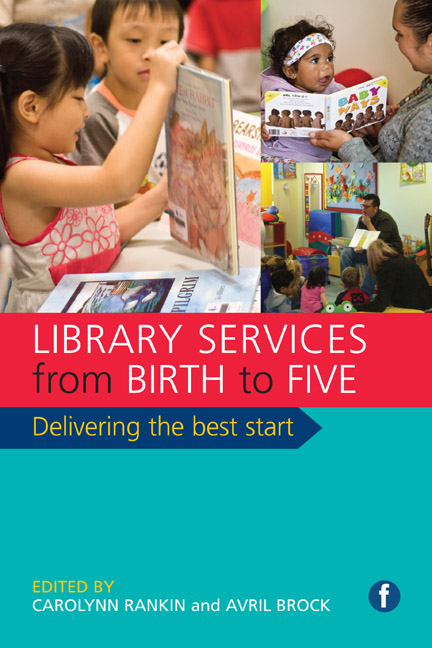Book contents
- Frontmatter
- Contents
- List of figures and tables
- Contributors
- Acknowledgements
- Introduction
- 1 Take them to the library: the pathway of opportunity
- 2 What you need to know about promoting early reading with young children from birth to five
- 3 Attribute value wrong, It should be `City of Literature ... it all starts with ABCD! The City of Melbourne and the Abecedarian Approach
- 4 Transforming practice through research: evaluating the Better Beginnings family literacy programme
- 5 People and partnerships, skills and knowledge
- 6 Resources for early years libraries: books, toys and other delights
- 7 Using digital media in early years library services
- 8 Using play to enhance early years literacy in babies and toddlers: ‘Read, Play and Grow’ at Brooklyn Public Library
- 9 Inclusive early literacy
- 10 Music and rhyme time sessions for the under-fives
- 11 Reaching your audience: the librarian's role
- 12 Successful library activities for the early years and ways to promote books effectively
- 13 Designing family-friendly libraries for the early years
- 14 Planning: organizing projects and money matters in the early years library
- Index
9 - Inclusive early literacy
Published online by Cambridge University Press: 08 June 2018
- Frontmatter
- Contents
- List of figures and tables
- Contributors
- Acknowledgements
- Introduction
- 1 Take them to the library: the pathway of opportunity
- 2 What you need to know about promoting early reading with young children from birth to five
- 3 Attribute value wrong, It should be `City of Literature ... it all starts with ABCD! The City of Melbourne and the Abecedarian Approach
- 4 Transforming practice through research: evaluating the Better Beginnings family literacy programme
- 5 People and partnerships, skills and knowledge
- 6 Resources for early years libraries: books, toys and other delights
- 7 Using digital media in early years library services
- 8 Using play to enhance early years literacy in babies and toddlers: ‘Read, Play and Grow’ at Brooklyn Public Library
- 9 Inclusive early literacy
- 10 Music and rhyme time sessions for the under-fives
- 11 Reaching your audience: the librarian's role
- 12 Successful library activities for the early years and ways to promote books effectively
- 13 Designing family-friendly libraries for the early years
- 14 Planning: organizing projects and money matters in the early years library
- Index
Summary
Introduction
In this chapter I hope to lay a firm foundation for early years librarians to consider their role in the provision of inclusive early literacy resources for children with disabilities (Kliewer et al., 2004). Over the past two decades, the work of early years children's librarians has evolved to include a significant role in the provision of early literacy resources for young children (Ward, 2007; American Library Association, 2011; Peterson, 2012). Much of this early literacy expertise is framed around the developmental trajectories of children who have typical development (Ghoting and Martin-Diaz, 2013). In order to best meet the needs of all children, including those with developmental disabilities, the public library's early literacy resource provision should include a range of inclusive approaches that are intentionally designed to be more likely to meet the needs of their community's developmentally diverse children (Prendergast, 2013). This chapter will lay out the rationale for building and increasing inclusive early literacy resources and supports in the public library setting.
Defining inclusive early literacy
In this chapter, when I use the term ‘inclusive early literacy’ I refer to early iteracy policies, discourses, programmes, practices and opportunities that consider the needs of diverse children and their families in order for children to participate together in the same setting. Inclusive early literacy ensures that young children with disabilities are able to experience early literacy alongside and in the same or similar ways as their age peers (Kliewer, 2008; Flewitt, Nind, and Payler, 2009; Mock and Hildenbrand, 2013).
Disabilities and exclusion
Before inclusive education, children with disabilities were routinely educated in separate environments alongside other children with disabilities. Prior to that, children with disabilities were often placed in institutions, with few or no educational opportunities offered to them at all. This harmful history contributed to the negative social perceptions of people with disabilities which persist today. For example, people with disabilities have often been presumed to be incompetent to acquire literacy (Kliewer, Biklen and Kasa-Hendrickson, 2006).
- Type
- Chapter
- Information
- Library Services from Birth to FiveDelivering the best start, pp. 183 - 198Publisher: FacetPrint publication year: 2019



